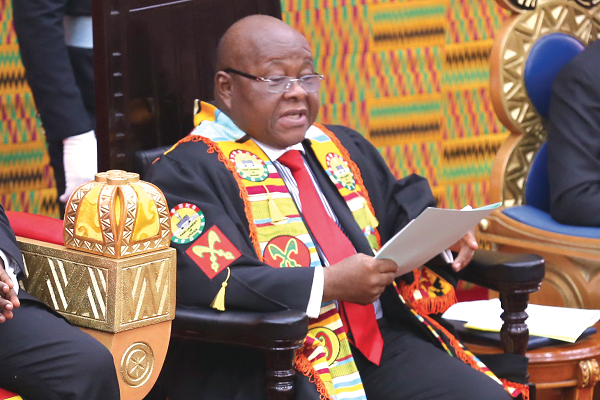Parliament suspends RTI Bill for the second time
Parliament has for the second time in five sitting days suspended the consideration of the Right to Information (RTI) Bill for lack of a quorum.
Coincidentally, it was the same legislator, the New Patriotic Party (NPP) Member of Parliament (MP) for Adansi Asokwa, Mr Kobina Tahiru Hammond, who raised the issue of the qurom.
He said the House did not have a quorum to continue the consideration of the Bill, which is supported by Standing Order 48 (2) and Article 102 of the 1992 Constitution.
Standing Order 48 (2) states: “If at the time of sitting, a member takes notice or objection that there are present in the House, besides the person presiding, less than one-third of the number of all the Members of Parliament, and after an interval of ten minutes a quorum is not present, the person presiding shall adjourn the House without question put until the next sitting day.”
Article 102 stipulates that: “A quorum of Parliament, apart from the one presiding, shall be one-third of all Members of Parliament.”
The National Democratic Congress (NDC) MP for Ningo-Prampram, Mr Samuel Nartey George, supported the motion for the suspension of the consideration.
Giving his ruling, the Second Deputy Speaker of Parliament, Mr Alban Bagbin, who was chairing, said his hands were tied because the about 36 MPs did not form a quorum.
He, therefore, suspended the consideration of the RTI Bill.
A third of the 275 legislators, which stands at 91, is needed to form a quorum in the House.
At the beginning of the current meeting on October 30, 2018, the Majority Leader, Mr Osei Kyei-Mensah-Bonsu, gave the assurance that the House would pass the RTI Bill into law before it rises in December 2018.
The RTI Bill has passed through the first and second readings and is at the consideration stage. There are 55 amendments proposed to be considered by the House.
Background
The object of the RTI Bill is to provide for the operationalisation of the constitutional right to information held by public and some private institutions, subject to exemptions that are necessary and consistent with the protection of public interest in a democratic society.
It also seeks to foster a culture of transparency and accountability in public affairs and to provide for related matters.
The RTI Bill was first drafted in 1999, reviewed in 2003, 2005 and 2007 but was only presented to Parliament in 2010. It was brought back to the Sixth Parliament but could not be passed till the expiration of that Parliament on January 6, 2016.
After months of waiting, the Bill was laid in Parliament early this year (2018) by the Deputy Attorney General and Minister of Justice, Mr Joseph Dindiok.
source: graphic online



